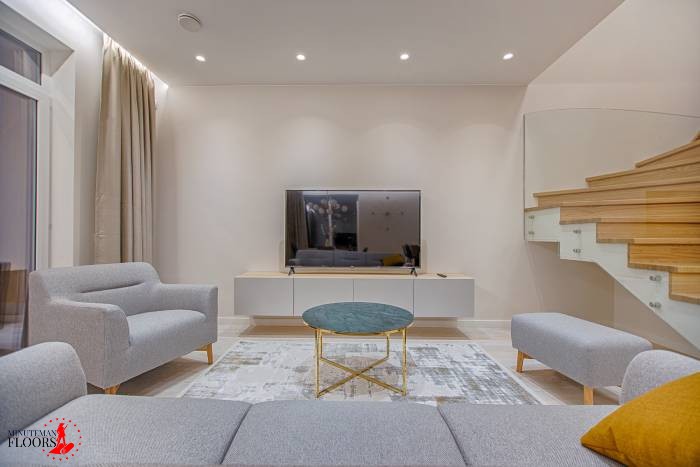When it comes to commercial setting, the flooring needs to be beautiful, functional, as well as durable. These three are the most important features you should look for when choosing the flooring material. And, commercial carpet flooring can meet all these and more.
Carpet is a popular type of flooring for both residential and commercial spaces. They’re relatively easy to install and maintain. However, not all types of carpets are suitable for high-traffic areas.
In this article, we’re discussing the best types of commercial grade carpet, their pros and cons, how to choose the right one, and more.
Looking for professional commercial carpet installation in Manchester, NH? Minuteman Floors does everything for you without you leaving your office. Call to schedule a visit by our experienced staff. We’ll come to you.
.
How Commercial Carpet Flooring Is Different from Regular Carpets?
Heavy-duty commercial carpet is manufactured in a way that offers the following qualities which are needed in any commercial setting.
- Excellent durability: Commercial carpets need to be able to withstand heavy foot traffic and maintain their original appearance and color under stress. To meet such demands, commercial carpet flooring is mostly made of synthetic materials, like nylon, with higher pile density that is more durable and resilient. In addition, high-traffic carpets have lower pile heights to reduce matting and crushing. This also makes cleaning easier because short pile heights don’t trap a lot of debris.
- Superior performance: You can get commercial carpets with anti-static and insulation properties (acoustic and thermal). Also, these carpets are designed to resist stains and fading. These qualities can improve the overall performance of the flooring.
- Safety: In any commercial setting, safety is the most important matter. That’s why, commercial-grade carpets are fire-resistant and slip-resistant to reduce the risk of mishaps and injuries.
- Low-maintenance: Commercial areas are usually crowded and the risk of spills and stains is high. So, a suitable carpet for such environments should be easy to clean and maintain. That’s why, commercial carpets come with coatings that resist soil and stain as well as lower pile heights.
- Aesthetics and customization: The flooring of a commercial space needs to match the overall design and style. Also, it should create the desired ambiance. What’s more, many commercial buildings prefer to customize the flooring to make unique patterns, such as incorporating their logos. Therefore, offering a wide variety of designs, textures, colors, and patterns is an important aspect of manufacturing commercial carpets.
These features are essential for a carpet used in commercial areas, otherwise, you’ll need frequent repairs and replacements.
Materials Used in Commercial Grade Carpet
Commercial quality carpets, like carpets used in residential areas, are made of different materials, including:
- Nylon: It’s a commonly used material in carpets that offers exceptional durability and stain resistance. Plus, nylon carpets come in a variety of styles and colors.
- Polypropylene: Also known as Olefin, polypropylene carpets are affordable and can resist moisture well. That’s why they’re popular in areas where frequent cleaning is necessary, like offices, hotels, etc. However, it’s not as durable and resilient as nylon carpets.
- Polyester: The most noticeable feature of polyester carpets is their softness. That’s why, they’re very comfortable and often used in areas where comfort is key, like hotel rooms. But it’s not a very durable material and can wear out relatively quickly compared to nylon.
- Wool: A natural and sustainable choice of material, wool offers insulation, durability, softness, and resistance. Wool carpets are expensive and luxurious, so they’re suitable for executive offices and high-end hotels.
- Blends: Some types of commercial carpets are made of a combination of different materials, for example, wool and nylon. This combination offers the best quality of each material. A wool and nylon blend carpet is more affordable than wool carpets, but it’s still durable, luxurious, soft, and resistant.
To sum up, you can choose from different types of carpet materials based on your budget, the requirements of the place, and the amount of foot traffic it gets. However, nylon carpets are the most popular in commercial use due to their longevity, resilience, stain resistance, versatility, and excellent durability.
Commercial Carpet Flooring Installation
Because foot traffic and dragging equipment and furniture in an office or any other commercial area can move the carpet, a professional commercial carpet flooring installation is necessary.
The installation methods that are used for these spaces need to provide a more secure bond to the subfloor. So, in most cases, direct glue-down and carpet adhesives are used to keep the carpet in place for a long time.
An easier choice is carpet tiles or modular sections. They’re easier to install and replace in case of damage.
5 of the Most Popular Commercial Carpets
Here are 5 different styles of carpets that are commonly used as commercial floor covering.
Cut Pile and Twist Pile
Cut pile carpets have a plush and soft surface due to the loops that are cut. So, they feel comfortable underfoot and add formality and elegance to the place. That’s why they’re suitable for
- executive offices,
- hotel suites,
- and high-end retail environments.
One special form of cut pile called twist pile, is more durable. It’s characterized by tightly twisted fibers which enhance the strengths and resilience. Saxony (with smooth and dense surface) and frieze (with less luxurious and textured surface) are other types of commercial cut pile carpets.
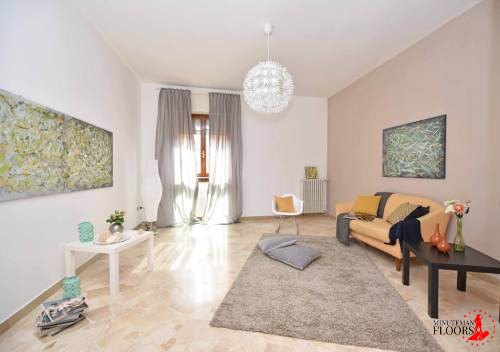
Advantages and Disadvantages of Cut Pile Carpet
Pros:
- Luxurious,
- Soft,
- Durable,
- Variety of styles, textures, and designs,
- Hiding stains and debris well.
Cons:
- It’s not as durable as loop pile carpets (see below).
- Footprints, vacuum marks, and indentations can be visible.
- In areas with heavy foot traffic, matting and crushing are possible, particularly if not maintained properly.
Berber Carpets
Berber carpets have a looped construction that gives them a flecked appearance and provides exceptional durability. These carpets are also stain-resistant, low-maintenance, and resistant to daily wear and tear in high-traffic environments. Perhaps because of these qualities, they’re functional for
- schools and kindergartens,
- libraries,
- healthcare facilities,
and any other commercial spaces that expect a lot of spills and dirt.
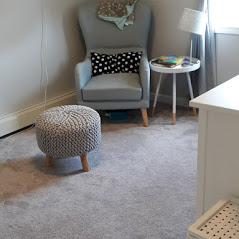
Pros and Cons of Commercial Berber Carpet
Pros:
- Excellent durability and resistance,
- Hiding footprints, stains, dirt, etc. pretty well,
- Resistant to stain,
- Low-maintenance,
- Easy to clean.
Cons:
- The loops can get snagged or pulled.
- It doesn’t come in various styles, designs, textures, and colors.
- It doesn’t feel as soft as cut pile carpets.
Loop Pile
Loop pile carpets are characterized by their uncut loops of yarn that come in different heights and densities. However, to make it more durable and resistant to wear and tear, for commercial use higher density and shorter pile height are used.
The textured surface of commercial loop pile carpets creates interesting visual effects and can withstand crushing and matting well. As a result, they’re a good choice for
- office hallways,
- hotel corridors,
- retail spaces,
and any other area with heavy foot traffic.
Pros and Cons of Commercial Loop Pile Carpet
Pros:
- Excellent durability,
- Resistance to daily wear and tear, matting, crushing, soil, and stain,
- Ability to hide vacuum marks and footprints,
- Low maintenance (compared to the cut pile),
- Visually interesting texture.
Cons:
- It doesn’t offer a wide variety of designs.
- There’s a risk of snag or pull because of the uncut loops.
- It’s not as soft as cut pile carpets underfoot.
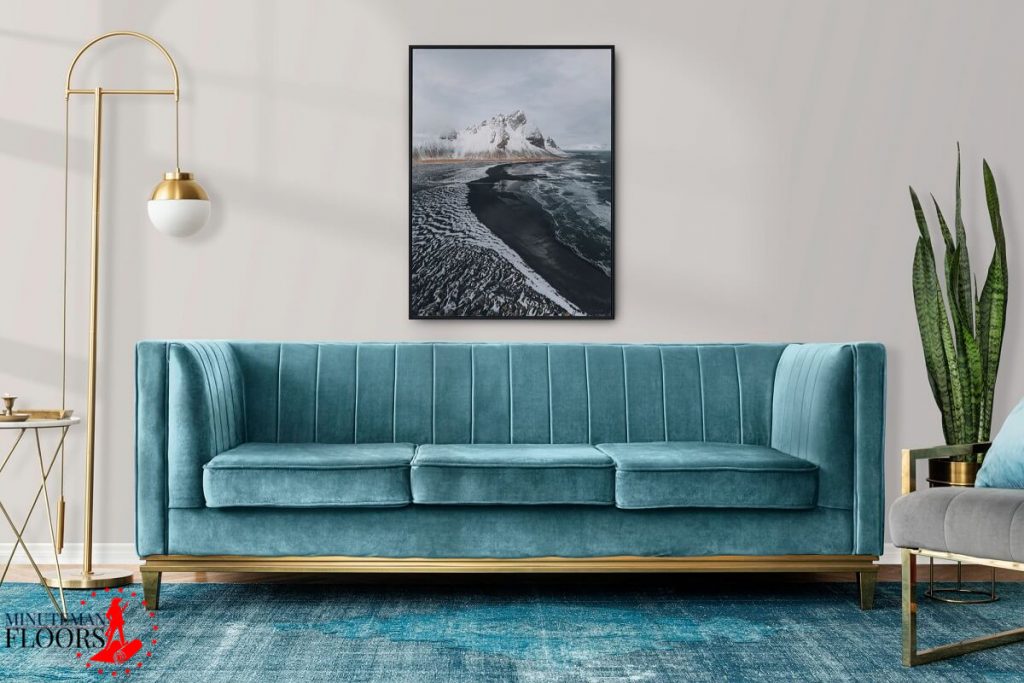
Carpet Tiles for Commercial Use
Carpet tiles come in square or rectangular pieces that can be installed very easily, just like putting pieces of a puzzle next to each other. Due to its modularity, you can mix and match the patterns, colors, and styles to create a unique floor. It’s also a very practical option because, in case of damage or stain, you can simply and easily replace the specific tile or wash it. So, they’re a great option for
- Kindergartens, schools, and any other educational institutions,
- Offices,
- retail stores,
- Hotels, motels, and other hospitality settings.
Pros and Cons of Commercial Carpet Tiles
Pros:
- Versatility of designs, colors, and patterns,
- Customizable,
- Easy to install, remove, and replace,
- Easy to maintain,
- Suitable for areas with unusual or irregular shapes.
Cons:
- It may not seem as seamless as other types of carpet, especially over time.
- It’s not as soft and comfortable as some other types of carpets, like broadloom (see below).
- Carpet tiles tend to be more expensive.
Broadloom Carpet
If you prefer a more seamless and uniform look, broadloom carpets can provide a sense of continuity and cohesion due to their wide and long rolls. You can see them in airports, convention centers, and any other areas where broad flooring coverage is needed. They’re also available in different styles, colors, and patterns.
Advantages and Disadvantages of Commercial Broadloom Carpet
Pros:
- Seamless look,
- Variety of designs,
- Customization,
- Acoustic insulation properties,
- Durable.
Cons:
- It’s not easy to install and only professionals can do it.
- In case of irreparable damage, the whole carpet may need to be replaced.
- Compared to carpet tiles, it doesn’t allow for a change in design when installed.
To sum up, various carpet styles can be used in commercial settings, but cut pile is the most commonly used one due to its durability, softness, and comfort, and the fact that it’s relatively easy to clean and maintain.
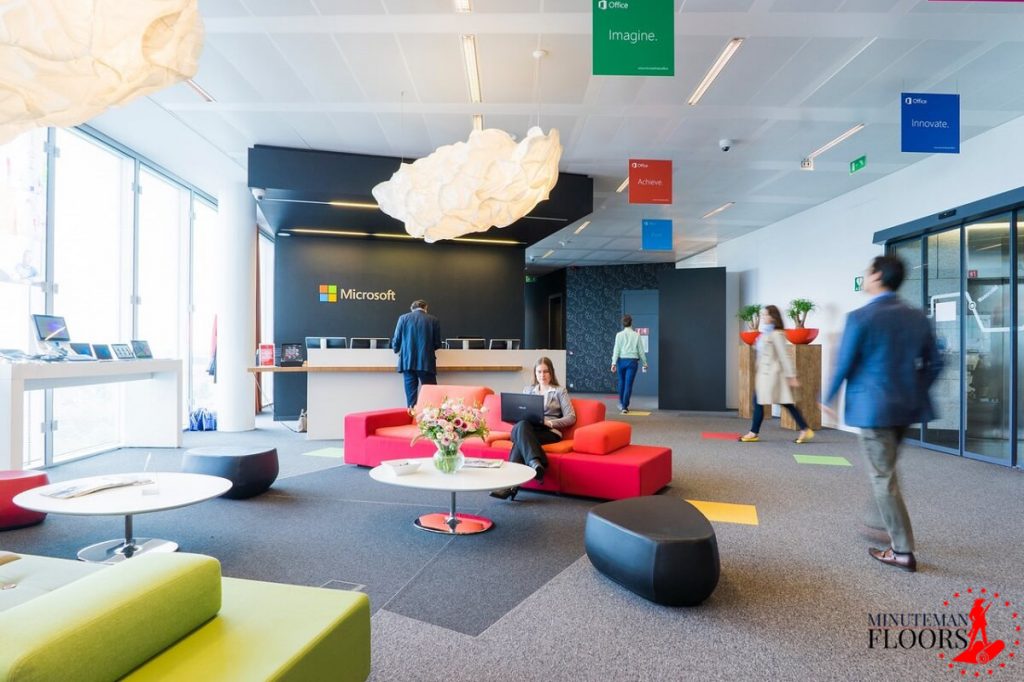
How to Choose the Best Commercial Carpet Flooring?
You can find various types and styles of commercial carpet flooring in the market. To choose the best one, you should consider
- The level of durability required.
- What kind of carpet damage is more likely, for example, spills, dirt, or matting?
- The amount of time, energy, and money you can spend on cleaning and maintenance.
- What are the safety hazards, for example slipping or fire?
- How sustainable and environmentally friendly do you want the carpet to be?
- Does the warranty cover durability and wear resistance?
- Its performance standards, like Carpet and Rug Institute (CRI) Green Label Plus certification.
- The ability to match the flooring design with the rest of your décor and the impression you want to make.
- The budget.
As it can be a costly and time-consuming process, we recommend consulting with a professional to make sure you’re making a decision you won’t regret.
Don’t hesitate to call us if you need our help when choosing the right type of flooring for your place.
FAQs about Commercial Carpet Flooring
As it’s a very common choice of flooring, we get a lot of questions about it. Let’s answer some of them briefly.
How Can I Maintain a Commercial Carpet Properly?
In commercial settings, except for daily cleaning (vacuuming) of high-traffic areas, you should also consider the following tips.
- Clean up the spills ASAP to avoid stains.
- At least once or twice a year, you should have it deep cleaned by professionals.
- Consult with a professional to determine a good schedule for reapplying stain-resistant treatment.
- Use entrance mats.
- Check the carpet regularly for any sign of damage and address the issues ASAP.
Are There Any Sustainable Commercial Carpets?
Yes. Some eco-friendly carpets include
- recycled nylon carpets,
- recycled polyester (PET) carpets,
- Bio-PET carpets,
- wool carpets,
- and carpets made of plant-based fibers.
How Long Does a Commercial Carpet Last?
It depends on the material and style of the carpet as well as the level of traffic and maintenance practices. However, we can say a commercial carpet may last between 5 to 15 years or even more if taken care of properly. So, the quality of the carpet and maintenance are the keys to a longer lifespan.
Can I Install Carpet flooring over Concrete?
Yes. But the subfloor should be in good condition.

Get Your Commercial Carpet Installed in Manchester, NH without Leaving Your Office
As we have seen, commercial carpet flooring can add comfort, warmth, and visual interest to your workplace very easily. However, a good installation is important in its lifespan and avoiding damage and safety issues.
Call Minuteman Floors at (603) 782-1942 for a professional and quick commercial carpet installation in the large area of Manchester, New Hampshire.
We will schedule to visit you and your place at a time that suits you and bring all the commercial carpet samples to choose the best one. Just leave it to us. (If you still have questions, read these FAQs.)

